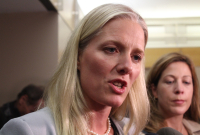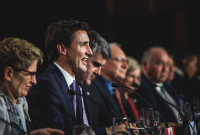Support strong Canadian climate journalism for 2025
Ontario's first cap-and-trade auction sold out all current allowances, giving the new market a strong start, but the province's environment minister warned the real test of the system will be in the emission reductions it brings about.
The March 22 auction brought in $472 million, the government said Monday.
But over the next 15 auctions, to the end of the compliance period in 2020, the market can probably expect "a reasonable amount of volatility and unpredictability," said Environment Minister Glen Murray.
"The participation rate, whether it's 100 per cent or 20 per cent or 50 per cent or 60 per cent or 13 per cent, is not the success of the market," he said. "The success of the market is really based on our ability to reduce (greenhouse gases). We will not expect to get 100 per cent all the time."
The system aimed at lowering greenhouse gas emissions puts caps on the amount of pollution companies in certain industries can emit. If they exceed those limits, they must buy an equal number of allowances at auction or from other companies that come in under their limits.
Most large emitters in Ontario are receiving allowances for free until 2020, which the government says is meant to prevent them from moving to jurisdictions without carbon pricing. But for now certain electricity importers, natural gas distributors and fuel suppliers are among those required to participate.
Bidders in the first auction included Union Gas, Enbridge Gas, Imperial Oil, the Greater Toronto Airports Authority, the city of Kingston, Ont., the University of Guelph, Ontario Power Generation, Apotex, Labatt, BP Canada Energy Group, Shell Energy North America and Suncor Energy Products Partnership.
The provincial Liberal government hopes the quarterly auctions will bring in $1.9 billion a year, to be invested in programs that reduce emissions and help businesses and consumers adapt to a low-carbon economy.
The auction floor price was $18.07 and the actual traded price was $18.08. Murray said he was pleased about that because he wanted the actual price to be as low as possible.
"One of the objectives of cap and trade is to manage the transition to a low carbon economy at the lowest-possible prices to Ontarians and Ontario businesses," he said. "So we didn't want to see early upward movement on that."
Since Jan. 1, cap and trade has added 4.3 cents per litre to the price of gasoline and about $80 a year to natural gas home heating costs, in addition to indirect costs that will be passed onto consumers.
The next auction is on June 6.





Comments